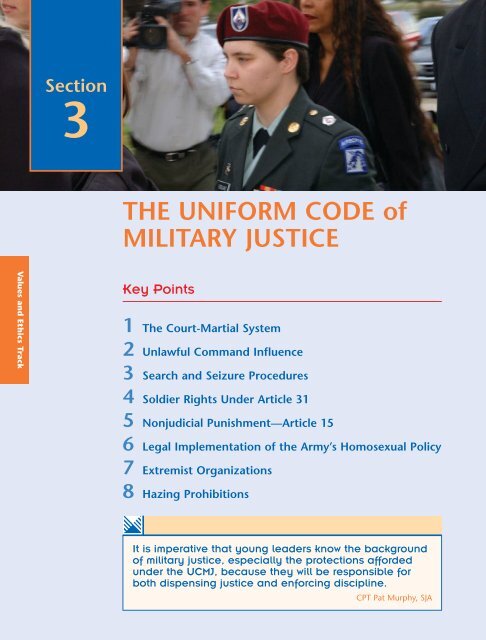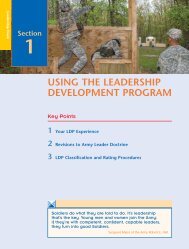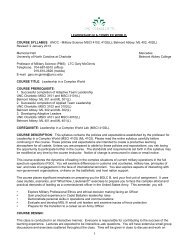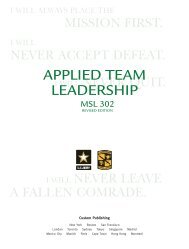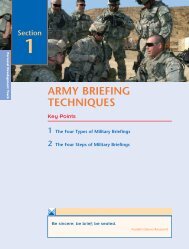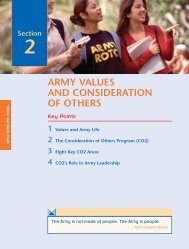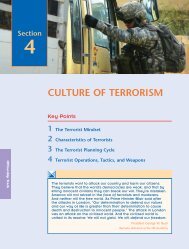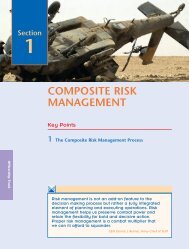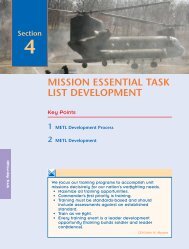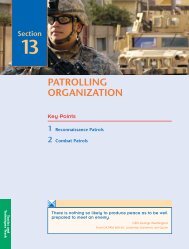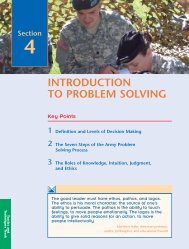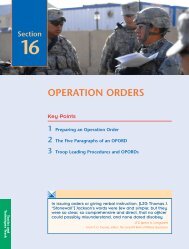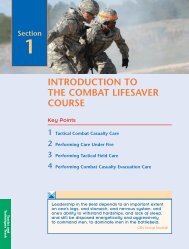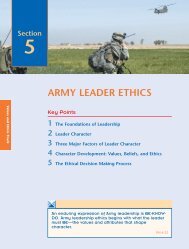THE UNIFORM CODE of MILITARY JUSTICE - UNC Charlotte Army ...
THE UNIFORM CODE of MILITARY JUSTICE - UNC Charlotte Army ...
THE UNIFORM CODE of MILITARY JUSTICE - UNC Charlotte Army ...
Create successful ePaper yourself
Turn your PDF publications into a flip-book with our unique Google optimized e-Paper software.
Section<br />
3<br />
<strong>THE</strong> <strong>UNIFORM</strong> <strong>CODE</strong> <strong>of</strong><br />
<strong>MILITARY</strong> <strong>JUSTICE</strong><br />
Values and Ethics Track<br />
Key Points<br />
1 The Court-Martial System<br />
2 Unlawful Command Influence<br />
3 Search and Seizure Procedures<br />
4 Soldier Rights Under Article 31<br />
5 Nonjudicial Punishment—Article 15<br />
6 Legal Implementation <strong>of</strong> the <strong>Army</strong>’s Homosexual Policy<br />
7 Extremist Organizations<br />
8 Hazing Prohibitions<br />
e<br />
It is imperative that young leaders know the background<br />
<strong>of</strong> military justice, especially the protections afforded<br />
under the UCMJ, because they will be responsible for<br />
both dispensing justice and enforcing discipline.<br />
CPT Pat Murphy, SJA
The Uniform Code <strong>of</strong> Military Justice ■ 91<br />
Introduction<br />
The purpose <strong>of</strong> the Uniform Code <strong>of</strong> Military Justice is to provide for a structured,<br />
orderly military force. So, unlike the civilian criminal justice system, the UCMJ <strong>of</strong>fers<br />
both judicial and nonjudicial punishments. In other words, commanders, rather than<br />
judges, can impose up to four types <strong>of</strong> punishments—or a combination <strong>of</strong> them—<br />
under Article 15 <strong>of</strong> the UCMJ.<br />
UCMJ authority lies with commanders. Your role as a lieutenant will be limited to<br />
reporting UCMJ violations committed by your Soldiers to your commander, and to<br />
making recommendations to your commander on the disposition <strong>of</strong> the <strong>of</strong>fense or the<br />
appropriate punishment your Soldiers should receive.<br />
As a soon-to-be-commissioned <strong>of</strong>ficer, it would behoove you to become familiar<br />
with the <strong>of</strong>fenses and penalties outlined in the Manual for Courts-Martial.<br />
What Would You Do?<br />
Your platoon’s task is to provide local security at a checkpoint in a city in Iraq.<br />
The task and the current threat level allow you the flexibility to rotate your<br />
squads. You establish the following rotation every three hours: One squad pulls<br />
the security mission, another squad conducts weapons maintenance and other<br />
assigned priorities <strong>of</strong> work, and the last squad is allowed to walk within a fourblock<br />
area as ambassadors to interact with the local populace. You do not<br />
authorize the squad to move in elements smaller than a team. After inspecting<br />
the squad at the checkpoint and doing spot checks <strong>of</strong> the squad conducting<br />
maintenance, you take your radiotelephone operator (RTO) and two Soldiers<br />
from 3rd squad to check the squad moving through the four-block area. From one<br />
corner, you observe two <strong>of</strong> your Soldiers not with the rest <strong>of</strong> their team, standing<br />
at a local vendor table. One is the team leader. You observe the team leader<br />
purchase an item from the vendor and move down the street. You approach the<br />
vendor and discover that the vendor is selling black-market music CDs and movie<br />
DVDs. A division policy memo states that no Soldier will purchase black-market<br />
items. Did this Soldier violate the UCMJ? If so, which articles and why? What<br />
action do you take? Do you elevate the <strong>of</strong>fense to your company commander? If<br />
so, what recommendation do you give as to how to dispose <strong>of</strong> the <strong>of</strong>fense?<br />
The Court-Martial System<br />
Procedure<br />
The goal <strong>of</strong> the court-martial system is justice. As in all American criminal courts, courtsmartial<br />
are adversary proceedings. That is, lawyers representing the government and the<br />
accused present the facts, legal aspects, and arguments most favorable to each side. In doing<br />
so, they follow the rules <strong>of</strong> procedure and evidence. Based upon these presentations, the<br />
judge decides questions <strong>of</strong> law. The court-martial members apply the law and decide
92 ■ SECTION 3<br />
The Manual for Courts-<br />
Martial can be<br />
downloaded from the<br />
Administrative link on<br />
the home page <strong>of</strong> the<br />
<strong>of</strong>ficial Department <strong>of</strong><br />
the <strong>Army</strong> Publications<br />
and Forms web site,<br />
http://www.army.mil<br />
/usapa/index.html<br />
staff judge advocate<br />
a lawyer for his or her<br />
command who provides<br />
legal services to<br />
commanders and<br />
advises court-martial<br />
convening authorities<br />
trial counsel<br />
the prosecutor in a<br />
court-martial, who<br />
represents the<br />
government<br />
defense counsel<br />
the attorney in a courtmartial,<br />
who represents<br />
the accused<br />
questions <strong>of</strong> fact. Only a court-martial can determine innocence or guilt. General and<br />
special court-martial convictions are equivalent to federal court convictions. As a result,<br />
a conviction is a federal conviction, and any time served will be in a federal penitentiary.<br />
At a court-martial, the trial counsel represents the government while the defense counsel<br />
represents the accused. Each counsel is duty-bound to do everything possible within the<br />
law to represent the client’s interests. Our country’s policy is to ensure that each Soldier<br />
charged with a crime has an opportunity to present the best possible defense. This system<br />
allows both sides to bring all issues before the court so it may make a just decision.<br />
Determination <strong>of</strong> Criminal Conduct<br />
A crime is an act punishable by law. Violations <strong>of</strong> <strong>Army</strong> regulations, state and federal<br />
laws, and the superiors’ orders may constitute criminal conduct punishable under the<br />
UCMJ by judicial punishment. You can resolve any question <strong>of</strong> what constitutes criminal<br />
conduct under the UCMJ by researching the UCMJ or the Manual for Courts-Martial<br />
(MCM), or by contacting your staff judge advocate or trial counsel. In many cases, a Soldier’s<br />
conduct may be substandard or personally <strong>of</strong>fensive without being criminal. Commanders<br />
handle such infractions through nonjudicial punishment.<br />
Relations with Staff Judge Advocates<br />
Staff judge advocates (SJAs) are lawyers for their commands. Their responsibility is to<br />
provide legal services to commanders and advise court-martial convening authorities<br />
(CMCAs). Staff judge advocates provide pr<strong>of</strong>essional guidance and assistance in both<br />
judicial and nonjudicial cases at all levels. There are two types <strong>of</strong> court-martial counsel:<br />
trial counsel and defense counsel.<br />
Trial Counsel<br />
The trial counsel is the prosecutor, a key individual in the court-martial process. The<br />
trial counsel represents the commander or the US government. The trial counsel is<br />
responsible for witnesses, documents, and all the other arrangements related to the trial.<br />
The commander establishes a good relationship with the trial counsel early in a case to<br />
prevent unnecessary delay. Command cooperation is essential to the complete presentation<br />
<strong>of</strong> the government’s case.<br />
Defense Counsel<br />
The defense counsel, generally assigned to the Trial Defense Service (TDS), is also a key<br />
individual in the court-martial process. To prevent conflicts <strong>of</strong> interest, TDS attorneys do<br />
not work for the SJA and are not in the SJA rating chain. The defense counsel is the accused’s<br />
representative and acts solely on his or her behalf. The defense counsel is required by law<br />
and ethics to present the best possible defense. This includes determining the facts and<br />
sometimes recommending rehabilitation for a Soldier.<br />
Types <strong>of</strong> Courts-Martial<br />
The court-martial system consists <strong>of</strong> three types <strong>of</strong> courts-martial: a summary court-martial,<br />
a special court-martial, and a general court-martial. The seriousness <strong>of</strong> the <strong>of</strong>fenses alleged<br />
generally determines the type <strong>of</strong> court-martial.<br />
Summary Court-Martial<br />
A summary court-martial (SCM) is a court composed <strong>of</strong> one commissioned <strong>of</strong>ficer who<br />
may or may not be a lawyer. The SCM handles minor crimes and has simple procedures.<br />
The maximum punishment—which depends upon the rank <strong>of</strong> the accused—is limited<br />
to confinement for one month; forfeiture <strong>of</strong> two-thirds pay for one month; and reduction<br />
in grade. A SCM may not try an accused against his or her will. If the Soldier objects, the
The Uniform Code <strong>of</strong> Military Justice ■ 93<br />
TABLE 3.1<br />
Courts-Martial in the <strong>Army</strong><br />
commander may consider trial by a higher court-martial. The accused does not have the<br />
right to military counsel at an SCM.<br />
Special Court-Martial<br />
A special court-martial (SPCM) consists <strong>of</strong> a military judge, at least three court<br />
members (unless the accused chooses to be tried by a military judge alone), a trial counsel,<br />
and a defense counsel. The maximum sentence is confinement for six months; forfeiture<br />
<strong>of</strong> two-thirds pay per month for six months; and reduction to the lowest enlisted grade.<br />
The SPCM convening<br />
authority is normally the<br />
first general <strong>of</strong>ficer in the<br />
Soldier’s chain <strong>of</strong><br />
command.
94 ■ SECTION 3<br />
adjudge<br />
to determine or decide<br />
by judicial procedure;<br />
adjudicate<br />
The SPCM convening authority may authorize the SPCM to pronounce, or adjudge, a badconduct<br />
discharge (BCD) as part <strong>of</strong> its maximum sentence. This proceeding is known as<br />
a BCD SPCM. It differs from an ordinary SPCM in that a verbatim court reporter is<br />
required. The accused has a right to an automatic appeal to the <strong>Army</strong> Court <strong>of</strong> Military<br />
Review if a BCD SPCM is adjudged.<br />
General Court-Martial<br />
A general court-martial (GCM) tries the most serious <strong>of</strong>fenses. It consists <strong>of</strong> a military<br />
judge, at least five court members (unless the accused elects to be tried by a military judge<br />
alone), a trial counsel, and a defense counsel. Both counsels must be lawyers. Unless the<br />
accused waives it, a formal investigation must occur before a general court-martial may<br />
try the case. In most cases, the <strong>Army</strong>’s Criminal Investigation Division (CID) conducts<br />
the investigation. The GCM may adjudge the most severe sentences authorized by law,<br />
including dishonorable discharge. In both GCMs and SPCMs, an enlisted accused may<br />
request that at least one-third <strong>of</strong> the court be enlisted Soldiers.<br />
Preferring Charges<br />
Preferral <strong>of</strong> charges is the first formal step in a court-martial. Preferral <strong>of</strong> charges consists<br />
<strong>of</strong> drafting a charge sheet containing the charges and specifications against the accused.<br />
The charge sheet must be signed by the accuser under oath. Once charges have been<br />
preferred they may be referred to one <strong>of</strong> the three types <strong>of</strong> courts-martial: summary, special,<br />
or general. A person who prefers charges must:<br />
1. Sign the charges and specifications under oath before a commissioned <strong>of</strong>ficer <strong>of</strong> the<br />
armed forces authorized to administer oaths<br />
2. State that the signer has personal knowledge <strong>of</strong> or has investigated the matters set<br />
forth in the charges and specifications and that they are true in fact to the best <strong>of</strong><br />
that person’s knowledge and belief.<br />
Restriction Procedures<br />
restriction<br />
the moral restraint <strong>of</strong> a<br />
Soldier’s movement to a<br />
specified area<br />
Depending on the severity <strong>of</strong> the charges, an accused may be restrained before his or her<br />
trial. The most severe forms <strong>of</strong> restraint are arrest and confinement. The least severe is<br />
conditions on liberty. Between these is “restriction.”<br />
Restriction is the moral restraint <strong>of</strong> a Soldier’s movement to a specified area. For<br />
example, depending on the nature <strong>of</strong> the <strong>of</strong>fense, commanders can restrict Soldiers to the<br />
battalion area, such as the barracks, mess hall, chapel, and place <strong>of</strong> duty, or restrict them<br />
from certain areas such as the enlisted club or bowling alley.<br />
Unless otherwise indicated, Soldiers are expected to perform their regular duties while<br />
restricted. Restriction <strong>of</strong> an enlisted Soldier may be imposed by any commissioned <strong>of</strong>ficer, and<br />
the authority may be delegated to warrant and noncommissioned <strong>of</strong>ficers. Restriction <strong>of</strong> an<br />
<strong>of</strong>ficer may only be done by order <strong>of</strong> a commander to whose authority the <strong>of</strong>ficer is subject.<br />
Critical Thinking<br />
e<br />
What must the commander do prior to ordering restraint?<br />
How must the Soldier be notified <strong>of</strong> restriction?<br />
What are the three consequences that result when a Soldier is placed under<br />
restriction?
The Uniform Code <strong>of</strong> Military Justice ■ 95<br />
Restriction procedures are as follows:<br />
1. Establish probable cause. Prior to ordering restriction <strong>of</strong> a Soldier, the commander<br />
must have probable cause, that is, reasonable belief that an <strong>of</strong>fense triable by courtmartial<br />
has been committed, that the person to be restrained committed it, and the<br />
restriction is required by the circumstances.<br />
2. Notify the Soldier. Notify the Soldier orally or in writing that he or she is under<br />
restriction. The notification must be delivered by the person imposing the<br />
restriction or by his or her representative.<br />
3. Make a written record. Make a written record <strong>of</strong> the exact terms <strong>of</strong> the restriction. It<br />
is advisable to have the Soldier sign an acknowledgement that he or she has received<br />
notice <strong>of</strong> the terms and limits <strong>of</strong> the restriction.<br />
4. A restriction is not a punishment. UCMJ, Article 13 and RCM 304(f) prohibit the use<br />
<strong>of</strong> restriction to punish a Soldier prior to trial. Restriction should only be as<br />
rigorous as is necessary to ensure the Soldier’s presence or to prevent future<br />
misconduct.<br />
5. Consequences <strong>of</strong> restriction. There are three important consequences when a Soldier<br />
is placed under restriction:<br />
probable cause<br />
reasonable grounds that<br />
an <strong>of</strong>fense has been<br />
committed<br />
• Restriction starts the 120-day speedy trial clock, even though charges may not yet<br />
be preferred<br />
• The sentencing authority will be informed <strong>of</strong> and take into consideration any<br />
restrictions the accused has been under when determining an appropriate sentence<br />
• If the terms <strong>of</strong> restriction are so onerous as to constitute a restriction tantamount<br />
to confinement, the restricted Soldier may receive administrative credit against the<br />
adjudged sentence.<br />
Disposition<br />
You may not understand why a court imposes a particular sentence. A court may hear<br />
evidence not known to you, or information available to you may not be presented or<br />
admissible at trial. The court-martial is responsible for determining the sentence. The<br />
members determine a sentence based on evidence, and it must serve:<br />
• The ends <strong>of</strong> good order and discipline in the military<br />
• The needs <strong>of</strong> the accused<br />
• The welfare <strong>of</strong> society.<br />
With these sentencing goals in mind, commanders must become familiar with the<br />
background <strong>of</strong> the <strong>of</strong>fense and the <strong>of</strong>fender in determining the disposition <strong>of</strong> the case. A<br />
minor <strong>of</strong>fense does not merit severe punishment and may <strong>of</strong>ten be best handled by the<br />
commander under the provisions <strong>of</strong> UCMJ, Article 15, or by administrative means. A more<br />
serious <strong>of</strong>fense may warrant a court-martial. The commander must consider all factors<br />
<strong>of</strong> the <strong>of</strong>fense.<br />
An accused’s performance in the civilian and military communities <strong>of</strong>ten shows his<br />
or her character and potential for rehabilitation. Commanders should generally treat a<br />
first-time <strong>of</strong>fender more leniently than they would a repeat <strong>of</strong>fender. They should talk to<br />
the Soldier’s supervisors and review personnel records, to decide what action will most<br />
benefit the Soldier and the <strong>Army</strong>. For example, if a commander considers the <strong>of</strong>fense to<br />
be serious but does not believe the accused should be punitively discharged, the commander<br />
may recommend trial by a court-martial with no authorization to impose a punitive<br />
discharge.
96 ■ SECTION 3<br />
In deciding what punishment to impose, a commander should consider:<br />
• Character and military service <strong>of</strong> the accused. What kind <strong>of</strong> Soldier is he or she?<br />
• Nature and circumstances <strong>of</strong> the <strong>of</strong>fense. What is the effect on morale, health, safety,<br />
welfare, and discipline?<br />
• Appropriateness <strong>of</strong> the punishment to the accused or <strong>of</strong>fense. Is the maximum<br />
punishment really appropriate?<br />
• Possible motives <strong>of</strong> the accuser. Treat an accuser respectfully, but treat the accusations<br />
with healthy skepticism.<br />
• Reluctance <strong>of</strong> the victim or others to testify. If witnesses refuse to come forward,<br />
another punishment may be appropriate.<br />
• Cooperation <strong>of</strong> the accused in apprehending or convicting others. If the accused agrees<br />
to help law enforcement apprehend others, leniency or clemency may be<br />
appropriate.<br />
TABLE 3.2<br />
Maximum Punishment Chart
The Uniform Code <strong>of</strong> Military Justice ■ 97<br />
• Availability and admissibility <strong>of</strong> evidence. Your judge advocate will be able to tell<br />
you how strong your case is, based on the evidence, and whether some evidence<br />
may be excluded.<br />
• Who has jurisdiction over the accused and <strong>of</strong>fenses? In some cases, who has jurisdiction<br />
over a case is an issue.<br />
Review and Appeal<br />
The court-martial presents the sentence to the court-martial convening authority for<br />
approval. The convening authority may reject the finding <strong>of</strong> guilty or reduce the sentence.<br />
After the convening authority’s action, the next step depends on the sentence. If the Soldier<br />
received a punitive discharge or confinement for one year or more and has not waived<br />
appellate review, the <strong>Army</strong> Court <strong>of</strong> Military Review (ACMR) in Washington, DC,<br />
automatically reviews the case. Senior judge advocate <strong>of</strong>ficers sit on the ACMR. If they<br />
reject the Soldier’s appeal, the Soldier may further appeal the case to the United States<br />
Court <strong>of</strong> Military Appeals (CMA), also in Washington, DC, which consists <strong>of</strong> five civilian<br />
judges. Finally, if CMA rules against him or her, the Soldier may ask the United States<br />
Supreme Court to hear the case.<br />
NOTE: Due to the high visibility a court-martial can bring to a command, many<br />
SJAs will not recommend trial by court-martial except for the most serious <strong>of</strong><br />
criminal <strong>of</strong>fenses, or unless the accused admitted to the <strong>of</strong>fense in a sworn<br />
statement during the CID or military police investigation, or unless the prosecution<br />
has irrefutable evidence. Even then, the SJA will also consider the accused’s rank,<br />
time <strong>of</strong> service, and military achievements. For example, a senior NCO or <strong>of</strong>ficer<br />
eligible for retirement would probably be recommended for administrative<br />
separation rather than trial by court-martial if the <strong>of</strong>fense is not severe with<br />
criminal intent.
98 ■ SECTION 3<br />
unlawful command<br />
influence<br />
attempted illegal<br />
influence by<br />
commanders on judicial<br />
proceedings<br />
Unlawful Command Influence<br />
Commanders must watch that they do not exert influence on proceedings in unlawful ways.<br />
The following are the “10 Commandments” <strong>of</strong> unlawful command influence:<br />
1. The commander may not order a subordinate to dispose <strong>of</strong> a case in a certain way<br />
2. The commander must not have an inflexible policy on disposition or punishment<br />
3. The commander, if he or she is the accuser, may not refer the case<br />
4. The commander may neither select nor remove court members in order to obtain a<br />
particular result in a particular trial<br />
5. No outside pressures may be placed on the judge or court members to arrive at a<br />
particular decision<br />
6. Witnesses may not be intimidated or discouraged from testifying<br />
7. The court decides punishment—an accused may not be punished before trial<br />
8. The commander should recognize that subordinates may “commit” command<br />
influence that will be attributed to the commander, regardless <strong>of</strong> his or her<br />
knowledge or intentions<br />
9. The commander may not have an inflexible attitude toward clemency<br />
10. If a mistake is made, raise the issue immediately.<br />
Search and Seizure Procedures<br />
The US Constitution protects every citizen from unreasonable searches and seizures. The<br />
right to privacy is not absolute, however. Courts have balanced individuals’ rights against<br />
society’s needs and have established rules for determining when a search is reasonable<br />
and lawful. Commanders may lawfully seize Soldiers’ property in their units after a legal<br />
search, inspection, or inventory. An unlawful search may violate a Soldier’s rights, however,<br />
and result in seized items being inadmissible in a court-martial. The evidence obtained<br />
from unreasonable searches may not be used in a trial. This discourages indiscriminate<br />
invasion <strong>of</strong> privacy by government <strong>of</strong>ficials. Under military law, senior commanders may<br />
authorize searches if they determine such searches will not violate Soldiers’ rights. A courtmartial<br />
may well review such decisions, however. Before any search or interrogation, Soldiers<br />
must be warned <strong>of</strong> their rights.<br />
Probable Cause to Search<br />
A commander may<br />
direct a search <strong>of</strong> any<br />
person or property in a<br />
place under his or her<br />
control only if probable<br />
cause exists.<br />
A commander may direct a search <strong>of</strong> any person or property in a place under his or her<br />
control only if probable cause exists. A company commander may authorize health-andwelfare<br />
inspections in company areas, but only post commanders may authorize searches<br />
or apprehensions in government quarters. A probable-cause search requires both <strong>of</strong> the<br />
following:<br />
• The commander must have a reasonable belief that evidence <strong>of</strong> the crime is on<br />
the person or at the place to be searched<br />
• The information and its source must be reliable.<br />
To establish probable cause, commanders need more than a suspicion, but they need not<br />
have absolute pro<strong>of</strong>. In other words, probable cause lies between suspicion and knowledge.<br />
The commander must conclude on the basis <strong>of</strong> information presented that the contraband<br />
or evidence <strong>of</strong> a crime is at that time likely to be in the possession <strong>of</strong> the suspect or on<br />
the premises to be searched. The commander’s determination that probable cause exists
The Uniform Code <strong>of</strong> Military Justice ■ 99<br />
must be reasonable and based on facts. It may not be based solely on others’ conclusions.<br />
A CID agent’s, first sergeant’s, or informant’s awareness <strong>of</strong> sufficient facts to provide probable<br />
cause is unimportant unless the commander who orders or authorizes the search receives<br />
those facts. That commander must believe the person furnishing the information and the<br />
information are reliable before probable cause can exist. Most post policies will require the<br />
unit commander to request SJA to issue an opinion on the proposed probable cause search<br />
to ensure the search is not illegal. The following examples are situations in which a<br />
commander would have probable cause to search.<br />
Example 1<br />
A reliable person informs the commander that he saw the suspect earlier that<br />
night with hashish. The commander trusts the informant because <strong>of</strong> their past<br />
association. The commander also believes the information is accurate because the<br />
informant saw the incident firsthand. The commander authorizes a search <strong>of</strong> the<br />
suspect’s person.<br />
This is a lawful search. The commander knew the informant and believed<br />
his information to be reliable.<br />
One <strong>of</strong> the fastest ways<br />
to ruin your<br />
commander’s chances <strong>of</strong><br />
a clean UCMJ<br />
proceeding is for you,<br />
the platoon leader, to<br />
conduct an illegal search<br />
or botch a legal search<br />
when assisting your<br />
commander.<br />
Example 2<br />
A person whose reliability is unknown informs the commander that the suspect is<br />
a drug pusher. The informant says that the accused has said that he is going to<br />
the city to make a “buy,” he will return by train at 1900 or thereabouts, he will be<br />
carrying a brown suitcase, and he will go to room 213 in the barracks to make his<br />
sale. The commander advises CID <strong>of</strong> these facts, and they in turn place the depot<br />
under surveillance. At 1900, the suspect steps <strong>of</strong>f a train arriving from the city. He<br />
is carrying a brown suitcase. He immediately takes a taxi to the barracks and goes<br />
directly to room 213. The CID advises the commander, and he authorizes a search<br />
that produces a large quantity <strong>of</strong> drugs.<br />
The search is lawful. Although the commander had no prior knowledge <strong>of</strong><br />
the informant’s reliability, so much <strong>of</strong> the information he supplied proved to be<br />
correct that the commander had good reason to believe that the rest <strong>of</strong> the<br />
information was also reliable.<br />
When Probable Cause Is Not Required<br />
The following paragraphs address searches that do not require probable cause to be lawful.<br />
Searches Incident to Lawful Apprehension<br />
A Soldier may be searched when and where he or she is legally apprehended. The point <strong>of</strong><br />
such a search is to discover weapons and prevent destruction <strong>of</strong> evidence. The search is<br />
limited to the Soldier’s person and the area within his or her immediate control. For<br />
example, the area within the Soldier’s immediate control might include an open wall locker<br />
within reach, but it might not include the entire room. A complete search <strong>of</strong> the passenger<br />
compartment <strong>of</strong> an automobile is permissible, however, even if the apprehended Soldier<br />
has been removed from the vehicle and cannot return to it.
100 ■ SECTION 3<br />
Searches <strong>of</strong> Government Property<br />
A search <strong>of</strong> government property does not require probable cause unless the person to<br />
whom the property is assigned or issued has a reasonable expectation <strong>of</strong> privacy. Generally,<br />
a person does not have a reasonable expectation <strong>of</strong> privacy in regard to government property<br />
that is not issued for personal use.<br />
Searches by Consent<br />
Probable cause is not necessary when a person freely consents to the search. Because consent<br />
is a waiver <strong>of</strong> the constitutional right <strong>of</strong> freedom from unreasonable searches, the<br />
government must be able to produce clear and convincing evidence that the consent was<br />
voluntary and not a submission to authority. Commanders should have a witness to a<br />
Soldier’s consent to a search. If the consent becomes an issue at a trial, the witness can<br />
verify its nature. If the search then uncovers evidence <strong>of</strong> criminal conduct, the evidence<br />
will be admissible at a trial. To establish voluntary consent, the suspect should be informed<br />
<strong>of</strong> both <strong>of</strong> the following:<br />
• The legal right to withhold consent<br />
• The fact that any evidence found during the search can be used against the suspect.<br />
The following examples are situations that lack probable cause to search.<br />
Example 1<br />
A CID agent calls the commander and states that he has apprehended one <strong>of</strong> the<br />
post’s Soldiers at the railroad station with marijuana on his person. The agent<br />
requests authority to search the suspect’s living area. Based solely on this<br />
information, the commander authorizes a search <strong>of</strong> the suspect’s wall locker,<br />
where the agent finds more marijuana.<br />
The search is unlawful. The commander had no evidence from which to<br />
reasonably conclude that the suspect had marijuana in his wall locker, which is<br />
located some distance from his place <strong>of</strong> apprehension. The commander must have<br />
more than mere suspicion.<br />
Example 2<br />
A reliable person informs the commander that three weeks ago he saw marijuana<br />
in the suspect’s footlocker. Based solely on this information, the commander<br />
authorizes a search <strong>of</strong> the suspect’s footlocker.<br />
This search is also unlawful. Since the reported possession was far removed in<br />
time, the commander had no valid reason to believe that the suspect still had any<br />
marijuana. Had the informant stated that he saw the suspect with marijuana in his<br />
footlocker that same day, probable cause would exist as the basis for a lawful search.<br />
Example 3<br />
A larceny occurs in the barracks, and a Soldier reports $500 and a dress missing.<br />
Three days later, Private Smith, the victim’s roommate, buys a stereo from the<br />
post exchange for $350. The victim, suspicious <strong>of</strong> her roommate, informs the<br />
commander. Based solely upon this information, the commander authorizes a<br />
search and discovers $200 and the dress in Private Smith’s wall locker.
The Uniform Code <strong>of</strong> Military Justice ■ 101<br />
The search is unlawful. Suspicion alone does not constitute probable cause.<br />
The commander should have continued the investigation until more information<br />
was uncovered, such as a report that another Soldier had seen the victim’s dress<br />
in the suspect’s wall locker.<br />
Seizures<br />
Evidence in open view or in a public area such as a dayroom or an open field may be lawfully<br />
seized without probable cause and without consent. The Fourth Amendment prohibits<br />
unreasonable seizure <strong>of</strong> the person, however. An unreasonable seizure may result in the<br />
evidence being inadmissible in a court-martial.<br />
Contacts and Stops<br />
Contact between an <strong>of</strong>ficial and a Soldier is frequently not considered detention and<br />
therefore not subject to the Fourth Amendment. Many contacts do not result from suspicion<br />
<strong>of</strong> criminal activity. Examples <strong>of</strong> lawful contacts include questioning witnesses to crimes<br />
and warning pedestrians that they are entering a dangerous neighborhood. These types<br />
<strong>of</strong> contacts are entirely reasonable, permissible, and within the normal activities <strong>of</strong> law<br />
enforcement personnel and commanders—they are not detentions in any sense.<br />
Officers, NCOs, and military police (MPs) may initiate contact with persons in any place<br />
the <strong>of</strong>ficers, NCOs, or MPs are lawfully situated. It is difficult to define when a person is<br />
lawfully situated. Generally, this includes inspecting the barracks, making a walk-through<br />
<strong>of</strong> the barracks or unit area, and presence in any place for a legitimate military purpose.<br />
An <strong>of</strong>ficer, NCO, or MP who reasonably suspects that a person has committed, is<br />
committing, or is about to commit a crime has the obligation to stop that person. He or<br />
she may stop both pedestrians and vehicle occupants. If the person stopped is a suspect to<br />
be questioned, the <strong>of</strong>ficial should read him or her Article 31 and the counsel warnings.<br />
The stop must be based on more than a hunch. The <strong>of</strong>ficial making the stop should be<br />
able to state specific facts to support the decision to stop an individual.<br />
Apprehensions<br />
Any <strong>of</strong>ficer, warrant <strong>of</strong>ficer, NCO, or MP may apprehend individuals with probable cause.<br />
Probable cause to apprehend requires the following:<br />
• A reasonable belief that a crime is being committed or has been committed<br />
• A reasonable belief that the person being apprehended is guilty <strong>of</strong> a crime.<br />
An example <strong>of</strong> probable cause to apprehend is when you or another reliable person have<br />
seen someone violate UCMJ, such as using marijuana, assaulting someone, breaking<br />
another’s property, or being drunk and disorderly. Probable cause requires a commonsense<br />
appraisal <strong>of</strong> all available facts and circumstances.<br />
As a new lieutenant, you may apprehend a Soldier anywhere and anytime—the only<br />
limitation is that you must have probable cause. To do so, you should identify yourself as<br />
an <strong>of</strong>ficer and show your ID card if you’re not in uniform. Tell the Soldier you are<br />
apprehending him or her and explain the reason, such as disorderly conduct, assault, or<br />
possession <strong>of</strong> marijuana. You may use help. Read the Soldier his or her Article 31 rights,<br />
preferably from a Rights Warning Card, as soon as possible.<br />
If the Soldier resists apprehension by running away or assaulting you, enlist others to<br />
help catch him or her. The Soldier may be prosecuted for resisting apprehension or<br />
disobeying an order. You may detain civilians until military or civilian police arrive.<br />
Visit your PAC <strong>of</strong>fice or<br />
contact your SJA for an<br />
Article 31 Rights<br />
warning card.
102 ■ SECTION 3<br />
Generally, as long as there is probable cause, no arrest warrant is required in the military.<br />
There is one important exception, however: A warrant is required for any apprehension<br />
in a private dwelling, such as on-post family quarters, the bachelor <strong>of</strong>ficer quarters (BOQ),<br />
the bachelor enlisted quarters (BEQ), or <strong>of</strong>f-post quarters. The barracks and field<br />
encampments are not considered private dwellings; therefore, no special authorization is<br />
needed to apprehend someone there.<br />
If the person to be apprehended is in a private dwelling, the apprehending <strong>of</strong>ficer must<br />
get authorization from a military magistrate or the commander with authority over the<br />
private dwelling (usually the installation commander). To apprehend a person at <strong>of</strong>f-post<br />
quarters requires coordination with civilian authorities.<br />
commander’s<br />
authority<br />
the authority <strong>of</strong> a<br />
commander to conduct<br />
a lawful inspection or<br />
other act<br />
Inspections<br />
Search and seizure requirements do not limit commander’s authority to conduct<br />
inspections. The primary purpose <strong>of</strong> inspections is to ensure the unit’s security, military<br />
fitness, and order and discipline. Orders for urinalysis are a permissible part <strong>of</strong> a valid<br />
inspection. An inspection can include an examination to locate and confiscate unlawful<br />
weapons or contraband as long as the inspection is not a pretext for a search—that is, the<br />
primary purpose <strong>of</strong> an inspection cannot be to obtain evidence for use in a trial or other<br />
disciplinary proceeding. This type <strong>of</strong> inspection is <strong>of</strong>ten referred to as a health-and-welfare<br />
inspection. An inspection for weapons or contraband may not be proper if any <strong>of</strong> the<br />
following occurs:<br />
• The inspection immediately follows a report <strong>of</strong> a specific <strong>of</strong>fense in the unit and<br />
was not scheduled before the report<br />
• Specific individuals are selected for inspection<br />
• People are inspected differently.<br />
Evidence discovered during a legitimate inspection may be seized and admitted at a<br />
court-martial.<br />
Inventories<br />
When a Soldier is absent without leave, is about to be confined, or is detained by civilian<br />
authorities, an inventory <strong>of</strong> that Soldier’s personal belongings is required. As with an<br />
inspection, an inventory may not be a pretext for search. Evidence obtained as a result <strong>of</strong><br />
a lawful inventory is admissible in a court-martial.<br />
Soldier Rights Under Article 31<br />
The military justice system provides certain fundamental rights and safeguards to Soldiers<br />
that must be considered in any case involving criminal conduct.<br />
Article 31 <strong>of</strong> the UCMJ grants every Soldier specific rights:<br />
• No person subject to this chapter may compel any person to incriminate himself<br />
or herself or to answer any question the answer to which may tend to incriminate<br />
him or her.<br />
• No person subject to this chapter may interrogate, or request any statement from,<br />
an accused or a person suspected <strong>of</strong> an <strong>of</strong>fense without first informing him or her<br />
<strong>of</strong> the nature <strong>of</strong> the accusation and advising him or her that he or she does not<br />
have to make any statement regarding the <strong>of</strong>fense <strong>of</strong> which he or she is accused or<br />
suspected and that any statement made by him or her may be used as evidence<br />
against him or her in a trial by court-martial
The Uniform Code <strong>of</strong> Military Justice ■ 103<br />
• No person subject to this chapter may compel any person to make a statement or<br />
produce evidence before any military tribunal if the statement or evidence is not<br />
material to the issue and may tend to degrade him or her.<br />
• No statement obtained from any person in violation <strong>of</strong> this article, or through the<br />
use <strong>of</strong> coercion, unlawful influence, or unlawful inducement may be received in<br />
evidence against him or her in a trial by court-martial.<br />
Presumption <strong>of</strong> Innocence<br />
Under our legal system, people are presumed innocent until a court finds them guilty<br />
beyond a reasonable doubt. A court may make a fair and just decision only after it has<br />
heard all the evidence relating to the guilt or innocence <strong>of</strong> an accused.<br />
The Right to Counsel<br />
The United States Constitution prohibits forcing an accused to incriminate himself or<br />
herself and provides that anyone suspected <strong>of</strong> committing a crime has the right to consult<br />
with a lawyer. Congress realized that Soldiers may not understand their rights and may<br />
be intimidated by the mere presence <strong>of</strong> a superior. Therefore, under military law, no one<br />
may question a suspect without first determining that the suspect understands the nature<br />
<strong>of</strong> the <strong>of</strong>fense, the right to remain silent, and the right to counsel. If investigators violate<br />
these rights, the evidence obtained may not be used against the accused. Commanders must<br />
protect their unit members’ rights and preserve the government’s case by ensuring that<br />
everyone in contact with the accused understands and complies with UCMJ, Article 31, and<br />
right-to-counsel requirements.<br />
All leaders should carry a<br />
laminated GTA 19-6-5,<br />
<strong>of</strong>ten referred to as the<br />
Verbal Rights Warning<br />
Card. This card contains<br />
the proper procedure for<br />
warning or advising<br />
Soldiers <strong>of</strong> their rights if<br />
they are suspected or<br />
accused <strong>of</strong> an <strong>of</strong>fense.<br />
The Soldier’s Right to Request Chapter 10 in Lieu <strong>of</strong> Court-Martial<br />
At any time before the convening <strong>of</strong> a court-martial, the accused can send a request for<br />
administrative separation under AR 635-200 Chapter 10 through his or her counsel to<br />
the court-martial convening authority. If the CMCA approves it, the court-martial process<br />
will cease and the accused will be immediately reduced to E-1 rank and separated under<br />
other than honorable (UOTH) characterization <strong>of</strong> service.<br />
SJAs will generally recommend to the CMCA approval <strong>of</strong> requests for Chapter 10 in<br />
lieu <strong>of</strong> court-martial because it resolves the case immediately and removes the need for a<br />
lengthy court-martial. This is especially the case if the government’s counsel does not believe<br />
it has a good chance to obtain a conviction under a court-martial.<br />
Prompt Action<br />
The Constitution and UCMJ, Article 10, guarantee the right to a speedy trial. The accused<br />
Soldier has the right to be advised <strong>of</strong> the charges against him or her as soon as possible.<br />
Normally, the accused must come to trial within 120 days <strong>of</strong> either arrest or preferral <strong>of</strong><br />
charges, whichever is earlier. An accused may not remain in continuous pretrial confinement<br />
more than 90 days for the same or related charges. A speedy trial assists both the government<br />
and the accused. Testimony given soon after an incident is more reliable than that given<br />
after a long period. Also, witnesses are likely to leave the area during a delay. Courts-martial<br />
may subpoena Soldiers who have moved as a result <strong>of</strong> a permanent change <strong>of</strong> duty station<br />
(PCS) to return to testify.<br />
The provost marshall will have strict guidelines as to what <strong>of</strong>fenses or circumstances<br />
warrant pretrial confinement. In most cases, the provost marshall will not authorize pretrial<br />
confinement unless the Soldier is a threat to self or others and has committed the most<br />
serious felony <strong>of</strong>fense, such as murder or rape.<br />
Commanders must<br />
consult with their SJA<br />
and carefully weigh the<br />
option for pretrial<br />
confinement and<br />
imposing restrictions on<br />
the accused. A good<br />
defense counsel could<br />
get a client credit for<br />
“time served,” resulting<br />
in a reduced sentence.
104 ■ SECTION 3<br />
Nonjudicial Punishment—Article 15<br />
Provisions <strong>of</strong> UCMJ, Article 15<br />
Under the provisions <strong>of</strong> UCMJ, Article 15, commanding <strong>of</strong>ficers may impose nonjudicial<br />
punishment on Soldiers who commit minor <strong>of</strong>fenses within their units. These Soldiers<br />
include commissioned <strong>of</strong>ficers, warrant <strong>of</strong>ficers, and other Soldiers. Nonjudicial punishment<br />
is not the same as nonpunitive disciplinary measures. To be punished under an Article<br />
15, Soldiers must violate an article <strong>of</strong> the UCMJ; that is, their conduct must be criminal.<br />
The crime must be minor, however, for nonjudicial punishment to be appropriate. All<br />
circumstances surrounding the <strong>of</strong>fense and the <strong>of</strong>fender’s personal history should be<br />
considered.<br />
Authority to Impose an Article 15<br />
Your commanding <strong>of</strong>ficer<br />
and battalion<br />
commander will likely<br />
solicit input from you as<br />
the platoon leader for<br />
the accused – as well as<br />
input from the accused’s<br />
entire NCO leadership –<br />
on matters <strong>of</strong> character,<br />
performance, and<br />
recommendation for<br />
punishment.<br />
Any commanding <strong>of</strong>ficer, including a warrant <strong>of</strong>ficer in command, may impose an Article<br />
15 unless a superior commander has restricted or withheld the authority to do so. For<br />
example, general <strong>of</strong>ficers in command <strong>of</strong>ten reserve to themselves the authority to impose<br />
nonjudicial punishment upon their <strong>of</strong>ficers. Many field grade commanders withhold the<br />
authority to dispose <strong>of</strong> certain UCMJ <strong>of</strong>fenses such as drug use and driving under the<br />
influence <strong>of</strong> alcohol. Only commanding generals and general court-martial convening<br />
authorities may delegate Article 15 authority. In no case may noncommissioned <strong>of</strong>ficers<br />
impose nonjudicial punishment, even on behalf <strong>of</strong> commanders.<br />
Company-grade <strong>of</strong>ficers in command may impose nonjudicial punishment as outlined<br />
in Table 3.3. If a company-grade <strong>of</strong>ficer does not feel that company-grade punishment is<br />
adequate for an <strong>of</strong>fense, he or she should forward the case to the field-grade commander<br />
with a request that the field commander exercise authority under the provisions <strong>of</strong> UCMJ,<br />
Article 15. The company-grade commander may not, however, recommend what<br />
punishment the <strong>of</strong>fender should receive when the Article 15 packet is forwarded to the<br />
field-grade commander for disposition.<br />
A field-grade <strong>of</strong>ficer may return a case to a company-grade <strong>of</strong>ficer for disposition. In<br />
no case may a superior direct that a subordinate commander take action under Article<br />
15. Nor may the superior dictate to a subordinate the type <strong>of</strong> punishment to administer<br />
under Article 15. A field-grade <strong>of</strong>ficer in command may impose punishment as outlined<br />
in Table 3.3.<br />
Critical Thinking<br />
e<br />
Consider whether military pr<strong>of</strong>essionals are legally, as well as morally, held to a<br />
higher standard <strong>of</strong> conduct than their civilian counterparts. If so, how does the<br />
court-martial process reflect this?<br />
Conduct <strong>of</strong> an Article 15<br />
Before taking action under Article 15, the commander must be satisfied that the misconduct<br />
was a UCMJ <strong>of</strong>fense and that an Article 15 is appropriate in view <strong>of</strong> the Soldier’s record.<br />
To determine if a crime has been committed, commanders should consult the<br />
subparagraphs under the appropriate punitive article in the Manual for Courts-Martial,<br />
Part IV, and always seek an opinion from SJA before proceeding with an Article 15. An<br />
imposing commander or a designated subordinate (<strong>of</strong>ficer or noncommissioned <strong>of</strong>ficer in<br />
the pay grade <strong>of</strong> E-7 or above) will inform the accused <strong>of</strong>:
The Uniform Code <strong>of</strong> Military Justice ■ 105<br />
TABLE 3.3<br />
Maximum Nonjudicial Punishments Under Article 15 (Formal Proceedings)<br />
Commanding Admonition Extra Correctional Forfeiture Reduction<br />
Officer or Reprimand Restriction Duties Custody <strong>of</strong> Pay in Rank<br />
Company Grade<br />
E-5 to E-9 Yes 14 days 1 14 days 1 No 7 days No<br />
E-1 to E-4 Yes 14 days 1 14 days 1 7 days 2,3 7 days To one grade<br />
(E-1 to E-3)<br />
lower<br />
Field Grade<br />
E-5 to E-9 Yes 60 days 45 days No 1 / 2 pay per To one grade<br />
month for lower if within<br />
2 months promotion<br />
authority 4<br />
E-1 to E-4 Yes 60 days 45 days 30 days 1 / 2 pay per To one or<br />
month for more grades<br />
2 months lower 4<br />
1. Restriction and extra duty may be combined, but in such a case, the total may not exceed the maximum allowed<br />
for extra duty.<br />
2. Enlisted Soldiers with a pay grade <strong>of</strong> E-4 may not be placed in correctional custody, but if their rank is reduced to a pay grade<br />
<strong>of</strong> E-3, they may be placed in correctional custody as a part <strong>of</strong> the same punishment.<br />
3. Enlisted Soldiers with pay grades <strong>of</strong> E-1 to E-3 may be confined for 3 days on bread and water when attached to or embarked<br />
on a vessel.<br />
4. The promotion authority for pay grades E-7, E-8, and E-9 rests with Headquarters, Department <strong>of</strong> the <strong>Army</strong>; AR 600-200 (paragraph<br />
7-36) prohibits reduction in rank for misconduct <strong>of</strong> Soldiers in these pay grades.<br />
• The nature <strong>of</strong> the alleged <strong>of</strong>fenses and the UCMJ articles violated<br />
• The intent to use summarized proceedings under UCMJ, Article 15<br />
• The maximum punishment<br />
• The right to remain silent<br />
• The right to demand trial<br />
• The consequences <strong>of</strong> a demand for trial<br />
• The right to confront witnesses, examine adverse evidence, and submit matters in<br />
defense, extenuation, and mitigation<br />
• The right to appeal.<br />
The accused must have reasonable time (normally 24 hours) to decide whether to demand<br />
trial or gather matters for defense, extenuation, and mitigation. He or she has no right to<br />
consult with legal counsel or to have a spokesperson at the proceedings. The accused also<br />
may not request an open hearing.<br />
Summarized Proceedings<br />
Commanders may use summarized proceedings when dealing with the misconduct <strong>of</strong> enlisted<br />
Soldiers. Punishment under summarized procedures will not exceed 14 days <strong>of</strong> restriction,<br />
14 days <strong>of</strong> extra duty, an oral reprimand or admonition, or any combination <strong>of</strong> these.<br />
Summarized proceedings are legibly recorded on DA Form 2627-1, which remains in<br />
the local unit personnel files for two years or until the Soldier transfers out <strong>of</strong> the unit,<br />
whichever occurs first. The results <strong>of</strong> a summarized Article 15 are not recorded on the<br />
Soldier’s enlisted record brief (ERB) as is the case with Article 15s.<br />
NOTE: The forms needed for administering UCMJ actions can be found on most<br />
installation servers using the Delrina FormFlow application. You can also review<br />
and download FormFlow forms from the <strong>Army</strong> website and the PERSCOM website.
106 ■ SECTION 3<br />
DA Form 2627 is the<br />
Record <strong>of</strong> Proceedings<br />
under UCMJ. It informs<br />
the Soldier <strong>of</strong> the charges<br />
against him or her and<br />
provides the Soldier with<br />
the opportunity to decide<br />
whether to submit to an<br />
Article 15 or take the<br />
matter to a court-martial.<br />
Formal Proceedings<br />
Formal proceedings for an Article 15 under UCMJ begin with the initial notification and<br />
conclude with the appeals process.<br />
Notification<br />
AR 27-10, Appendix B, contains a guide for nonjudicial punishment proceedings. The first<br />
step in conducting an Article 15 is to notify the Soldier both orally and in writing. The<br />
commander or a designated subordinate (<strong>of</strong>ficer or noncommissioned <strong>of</strong>ficer in the grade<br />
<strong>of</strong> E-7 or above) must inform the Soldier <strong>of</strong> the commander’s intent to initiate the process.<br />
The initial notification must include a brief statement <strong>of</strong> the <strong>of</strong>fense. If you are performing<br />
the notification, describe the <strong>of</strong>fense to the Soldier in simple language and then record<br />
the discussion in Items 1 and 2 <strong>of</strong> DA Form 2627. Use the model specification forms in<br />
the Manual for Courts Martial (MCM), Part IV, to draft Item 1 on the form. You must<br />
also tell the Soldier the maximum punishment that he or she could receive under Article 15<br />
and that further misconduct can result in administrative separation.<br />
Acknowledgement<br />
The accused must acknowledge notification by completing DA Form 2627, Item 3. The<br />
subsequent course <strong>of</strong> the proceeding depends upon the accused Soldier’s decisions regarding<br />
the following:<br />
Demand for court-martial. If the Soldier demands trial by court-martial, the commander<br />
must terminate the Article 15 and decide whether to prefer court-martial charges.<br />
Waiver <strong>of</strong> court-martial and failure to submit matters or to demand a hearing. If the<br />
accused chooses this option, the commander may determine his or her guilt and<br />
immediately impose punishment.<br />
Waiver <strong>of</strong> court-martial and hearing with submission <strong>of</strong> matters. If the accused chooses<br />
this option, the commander must consider the matters before deciding whether to impose<br />
punishment. If the matters persuade the commander that the accused is innocent or that<br />
there is a valid reason for not punishing the Soldier, the commander simply terminates the<br />
Article 15. If, after considering the matters, the commander is convinced beyond a<br />
reasonable doubt that the accused is guilty and nonjudicial punishment is appropriate, the<br />
commander may impose it.<br />
Waiver <strong>of</strong> court-martial and demand for hearing. In this case, the commander must<br />
arrange for and conduct a hearing before deciding whether to impose nonjudicial<br />
punishment. Often, commanders conduct hearings in their <strong>of</strong>fices. They must personally<br />
conduct the hearing except in rare circumstances in which doing so is not practicable. In<br />
such a case, the commander must appoint another <strong>of</strong>ficer to conduct the hearing.<br />
Afterwards, the appointed <strong>of</strong>ficer should submit a summary and written recommendations<br />
to the commander.<br />
The commander should initiate the hearing by advising the accused <strong>of</strong> his or her rights<br />
under UCMJ, Article 31. During the hearing, a spokesperson may represent the accused.<br />
That person need not be an attorney, and his or her participation in the case must be<br />
voluntary. The government will not pay travel fees or other costs to ensure the spokesperson’s<br />
presence at the hearing. Neither the accused nor the spokesperson may examine or crossexamine<br />
witnesses without the commander’s permission. The accused or the spokesperson<br />
may brief the commander, however, on the relevant issues and areas <strong>of</strong> suggested inquiry.<br />
The commander must explore those issues and areas when questioning witnesses.<br />
The accused may indicate which witnesses he or she prefers at the hearing. If those<br />
witnesses are reasonably available, the commander must arrange for their presence. The
The Uniform Code <strong>of</strong> Military Justice ■ 107<br />
government will not pay witness or transportation fees to ensure their presence. Reasonably<br />
available witnesses include those on duty at the installation and those whose presence can<br />
be arranged without spending government travel funds and whose attendance at the hearing<br />
will not materially delay the proceedings. The accused may waive personal appearance at<br />
the hearing and instead submit written matters to the commander for consideration. The<br />
commander should give such matters due consideration before deciding the case.<br />
Punishment<br />
Table 3.3 outlines the maximum nonjudicial punishments authorized under Article 15.<br />
Note that a field-grade commander may impose greater punishment than a company-grade<br />
commander. A field-grade commander and a company-grade commander may not both<br />
impose an Article 15 for the same act <strong>of</strong> misconduct. Nor will a commander ordinarily<br />
impose an Article 15 for the same <strong>of</strong>fense over which a civil court has exercised jurisdiction<br />
or an <strong>of</strong>fense for which the commander plans to recommend a court-martial. Commanders<br />
must also be aware <strong>of</strong> certain limitations on punishment. They must base any forfeiture<br />
<strong>of</strong> pay upon the grade to which an <strong>of</strong>fender is reduced and not upon his or her original<br />
grade, even if the reduction is suspended. Commanders may combine restriction and extra<br />
duties, but only for the maximum time allowed for extra duties alone. In no case may a<br />
commander combine restriction or extra duties with correctional custody. The commander<br />
must personally inform the <strong>of</strong>fender <strong>of</strong> the punishment. At that time, the commander may<br />
explain any factors considered when he or she decided on the punishment. The commander<br />
should also inform <strong>of</strong>fenders <strong>of</strong> their right to appeal and explain how to do so.<br />
Legal Implementation <strong>of</strong> the<br />
<strong>Army</strong>’s Homosexual Policy<br />
The Department <strong>of</strong> Defense’s (DoD) policy on homosexuality—<strong>of</strong>ten referred to as “don’t<br />
ask, don’t tell”—has caused a great deal <strong>of</strong> comment. This mirrors a general debate in<br />
American society over homosexuality. The general policy is that a person’s sexual orientation<br />
is considered a personal and private matter and is not a bar to entry or continued service<br />
unless manifested by homosexual conduct.<br />
The <strong>Army</strong> does not ask applicants for enlistment, appointment, or induction whether<br />
they are heterosexual, homosexual, or bisexual. The <strong>Army</strong> also does not require applicants<br />
to reveal whether they have engaged in homosexual conduct unless it receives independent<br />
evidence indicating that the applicant has engaged in such conduct or unless the applicant<br />
volunteers a statement that he or she is a homosexual or a bisexual, or words to that<br />
effect. Homosexual conduct, however, is grounds for barring entry into and for separation<br />
from the <strong>Army</strong>.<br />
Military policy is focused on a Soldier’s conduct, not on his or her sexual orientation—<br />
on actions, not appearances. The <strong>Army</strong> requires articulable facts as a basis for discharging<br />
a Soldier. These facts are either statements, acts, or marriage (SAM).<br />
A Soldier’s declaration that “I’m gay” or “I’m a lesbian” would be an example <strong>of</strong> a<br />
statement. Acts would include bodily contact to satisfy sexual desire, kissing, handholding,<br />
or slow dancing with a member <strong>of</strong> the same sex. Marriage includes actual or attempted<br />
marriage with a member <strong>of</strong> the same sex.<br />
Two special rules govern whether the <strong>Army</strong> may retain a Soldier found to have engaged<br />
in homosexual conduct:<br />
homosexual conduct<br />
a homosexual act; a<br />
statement by a Soldier<br />
that demonstrates a<br />
propensity or intent to<br />
engage in homosexual<br />
acts; the solicitation <strong>of</strong><br />
another Soldier to<br />
engage in a homosexual<br />
act or acts; a<br />
homosexual marriage or<br />
attempted marriage<br />
Special Rule 1. A Soldier’s statement that he or she is homosexual is generally taken<br />
as a fact and will result in separation proceedings. If the Soldier can convince the<br />
Administrative Board, however, that he or she will not participate in further homosexual<br />
acts, he or she may be retained.
108 ■ SECTION 3<br />
Special Rule 2. Soldiers who make false statements that they are homosexual or<br />
that they have committed homosexual acts to avoid a military obligation have<br />
violated <strong>Army</strong> policy and betrayed their military duty. Such Soldiers may be subject<br />
to action under the UCMJ.<br />
Inquiries<br />
Certain guidelines govern the conduct <strong>of</strong> inquiries into whether Soldiers have committed<br />
homosexual conduct:<br />
• Only commanders can initiate inquiries<br />
• There must be credible evidence (SAM)<br />
• Informal inquiries are preferable<br />
• Formal inquiries can be conducted at the Department <strong>of</strong> the <strong>Army</strong> level only.<br />
As with most policy issues, you should always check with your local judge advocate general<br />
(JAG) <strong>of</strong>fice and your commander when you are not sure what you should do next.<br />
When you are interviewing a Soldier, make sure you advise the Soldier <strong>of</strong> his or her<br />
rights against self-incrimination (Article 31, UCMJ) and be sure the Soldier understands<br />
the DoD policy on homosexual conduct.<br />
Evidence<br />
Before you react to allegations, you must make sure the evidence is credible. Don’t go on<br />
a fishing expedition. If the source <strong>of</strong> the allegations is not credible, then note the source<br />
as such and stop any further actions. Suspicion, opinions, and rumors are not credible<br />
evidence. The mere fact that a Soldier has read homosexual materials or gone to a<br />
homosexual establishment, such as a “gay bar,” is not credible evidence. Nor are statements<br />
a Soldier has made when obviously trying to avoid duty or get out <strong>of</strong> the <strong>Army</strong>.<br />
Critical Thinking<br />
e<br />
If a Soldier is seen going into a gay bar, why can’t it be assumed that he or she is<br />
a homosexual? What about a Soldier who marches in civilian clothes in a gay<br />
rights parade?<br />
Confidentiality<br />
In all disciplinary action, you must ensure confidentiality where appropriate. Talking about<br />
others without any <strong>of</strong>ficial findings is simply spreading rumors. This undermines your<br />
own authority. Remember that statements a Soldier makes to a chaplain, attorney, or spouse<br />
are considered confidential.<br />
Undertaking an investigation without the commander’s permission or accusing a<br />
Soldier <strong>of</strong> engaging in homosexual conduct when you have no credible evidence is a<br />
violation <strong>of</strong> the DoD policy on homosexual conduct.<br />
Anti-Harassment Policy<br />
The <strong>Army</strong> does not tolerate harassment <strong>of</strong> a Soldier by others simply because they believe<br />
the Soldier is a homosexual. Defense Department policy provides that in such cases, the<br />
Soldier must seek out help from his or her chain <strong>of</strong> command, a military chaplain, the
The Uniform Code <strong>of</strong> Military Justice ■ 109<br />
inspector general’s <strong>of</strong>fice, or the JAG. The fact that a Soldier has been harassed for alleged<br />
homosexuality is not grounds for an investigation <strong>of</strong> the Soldier for homosexual conduct<br />
unless there is credible evidence <strong>of</strong> such conduct. Individuals harassing Soldiers for alleged<br />
homosexuality are themselves subject to investigation by military police or by the criminal<br />
investigation division. The investigation will focus only on the allegations <strong>of</strong> harassment<br />
or threats, unless there is credible evidence <strong>of</strong> homosexual conduct on the Soldier’s part.<br />
To review the <strong>Army</strong>’s policy on homosexual conduct:<br />
• You must have credible evidence <strong>of</strong> homosexual conduct to pursue actions against<br />
an accused Soldier<br />
• Only a Soldier’s commander may conduct fact-finding inquiries<br />
• Accused Soldiers have rights against self-incrimination<br />
• The Department <strong>of</strong> the <strong>Army</strong> must approve any substantial investigation<br />
• The <strong>Army</strong> will investigate harassment <strong>of</strong> a Soldier for perceived or real homosexual<br />
conduct as a separate action not related to whether the allegations <strong>of</strong> homosexual<br />
conduct are true.<br />
Extremist Organizations<br />
Participation in extremist organizations is inconsistent with military service. This includes<br />
organizations or activities that advocate racial, gender, or ethnic hatred or intolerance.<br />
Commanders have widespread authority to prohibit Soldiers from participation in these<br />
activities.<br />
The prohibitions against participation in extremist activities include:<br />
• Attending public demonstrations or rallies<br />
• Attending in uniform<br />
• Fundraising<br />
• Recruiting or training for the organization<br />
• Holding a visible leadership role in the organization<br />
• Distributing the organization’s literature.<br />
extremist<br />
organizations<br />
organizations that<br />
advocate racial, gender,<br />
or ethnic hatred or<br />
intolerance<br />
Hazing Prohibitions<br />
Hazing is any conduct by a service member, regardless <strong>of</strong> rank, that is cruel, abusive,<br />
humiliating, impressive, demeaning, or harmful to another service member, regardless <strong>of</strong><br />
rank. Hazing includes:<br />
• Abusive or harmful practical jokes<br />
• Branding<br />
• Tattooing<br />
• Body painting<br />
• “Blood wings” ceremonies<br />
• Forced consumption <strong>of</strong> alcohol.<br />
hazing<br />
conduct by a service<br />
member, regardless <strong>of</strong><br />
rank, that is cruel,<br />
abusive, humiliating,<br />
impressive, demeaning,<br />
or harmful to another<br />
service member,<br />
regardless <strong>of</strong> rank
110 ■ SECTION 3<br />
TABLE 3.4<br />
UCMJ, The Punitive Articles
The Uniform Code <strong>of</strong> Military Justice ■ 111<br />
e<br />
CONCLUSION<br />
Although commanders are the only ones who are granted UCMJ authority, as a<br />
lieutenant, you will find yourself playing important roles in the military justice<br />
system. Become familiar with the system and the Manual for Courts-Martial. Ally<br />
yourself with the unit’s staff judge advocate and learn from the experience <strong>of</strong><br />
your company commander, your company’s first sergeant, and your platoon<br />
sergeant. Their advice and guidance will help you through the Article 15 and<br />
court-martial process for anyone in your platoon who violates the UCMJ.<br />
Before a Soldier’s sentencing, lieutenants must be prepared to make a recommendation<br />
to the company commander regarding punishment. Ask the accused’s<br />
NCO leaders (team leader through platoon sergeant) for their recommendation<br />
on punishment. It is important for both you and your platoon sergeant to be on<br />
“the same sheet <strong>of</strong> music” on the recommended punishment you forward to your<br />
commander.<br />
This will not always be the case, however. A young, inexperienced, and newly<br />
promoted E-5 team leader may want to be lenient on his E-4 team member who<br />
was a battle buddy and roommate before the E-5’s promotion. At other times,<br />
you as the platoon leader may see promise in a Soldier who has driven your NCOs<br />
to the limits <strong>of</strong> their patience. As a young lieutenant, always consider that your<br />
senior NCOs may know the Soldier better than you. If your NCOs make one recommendation<br />
to the commander, and you make another, it may indicate to your<br />
commander that a more serious problem exists between you and your NCOs.<br />
Now is the time to prepare. Unfortunate timing may place you in the middle<br />
<strong>of</strong> a UCMJ action for one <strong>of</strong> your Soldiers when you arrive at your first unit. You<br />
want to be ready.<br />
Learning Assessment<br />
1. List actions that employ the administration <strong>of</strong> military justice at the unit level.<br />
2. Identify the key elements <strong>of</strong> the judicial punishment process.<br />
3. Identify the inquiry process.<br />
4. Identify search and seizure procedures.<br />
5. Identify a Soldier’s rights under Article 31(b), UCMJ.<br />
6. Identify restriction procedures.<br />
7. Discuss unlawful command influence.<br />
8. Identify your role in the administration <strong>of</strong> nonjudicial punishment.
112 ■ SECTION 3<br />
9. Identify the legal implications <strong>of</strong> the homosexual policy.<br />
10. Identify prohibition against membership and participation in extremist organizations.<br />
11. Identify hazing prohibitions.<br />
Key Words<br />
staff judge advocate<br />
trial counsel<br />
defense counsel<br />
adjudge<br />
restriction<br />
probable cause<br />
unlawful command influence<br />
commander’s authority<br />
homosexual conduct<br />
extremist organizations<br />
hazing<br />
References<br />
Field Manual 27-1, Legal Guide for Commanders. 13 January 1992.<br />
Uniform Code <strong>of</strong> Military Justice (United States Code, Title 10, Subtitle A, Part II,<br />
Chapter 47). 1950.<br />
Manual for Courts-Martial, United States. 2002.
The Uniform Code <strong>of</strong> Military Justice ■ 113


